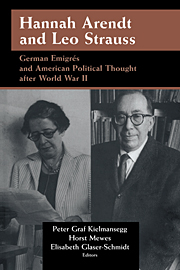Book contents
- Frontmatter
- Introduction
- PART I HANNAH ARENDT
- PART II LEO STRAUSS
- 4 Reflections on Leo Strauss and American Education
- 5 Leo Strauss: The Quest for Truth in Times of Perplexity
- 6 Leo Strauss and Martin Heidegger: Greek Antiquity and the Meaning of Modernity
- 7 Leo Strauss: German Origin and American Impact
- 8 The Modern World of Leo Strauss
- PART III ROUNDTABLE DISCUSSION
- Select Bibliography of Works by Arendt and by Strauss on Modern Political Science and Philosophy
- Index
5 - Leo Strauss: The Quest for Truth in Times of Perplexity
Published online by Cambridge University Press: 05 January 2013
- Frontmatter
- Introduction
- PART I HANNAH ARENDT
- PART II LEO STRAUSS
- 4 Reflections on Leo Strauss and American Education
- 5 Leo Strauss: The Quest for Truth in Times of Perplexity
- 6 Leo Strauss and Martin Heidegger: Greek Antiquity and the Meaning of Modernity
- 7 Leo Strauss: German Origin and American Impact
- 8 The Modern World of Leo Strauss
- PART III ROUNDTABLE DISCUSSION
- Select Bibliography of Works by Arendt and by Strauss on Modern Political Science and Philosophy
- Index
Summary
In the aftermath of the breakdown of the Marxist-Leninist empire in Eastern Europe, fundamental questions about politics force themselves on the public discourse of the peoples who are trying to reconstruct civil society. What was rightly called the theme of political philosophy by Leo Strauss has once again been put on the agenda of European political debate: “mankind's great objectives, freedom and government or empire - objectives which are capable of lifting all men beyond their poor selves.”.
As a consequence of the collapse of socialist orders, reflections on the good society, good life, and common good emerge. These thoughts raise some doubts about accepting the liberal-capitalistic system hook, line, and sinker insofar as the totalitarian systems are “a convex mirror of all modern civilization and a harsh, perhaps final call for a global recasting of that civilization's self-understanding.” Václav Havel, the author of these lines, goes on to say that the totalitarian systems are “most of all, a convex mirror of the inevitable consequences of [modern] rationalism, a grotesquely magnified image of its own deep tendencies, an extreme outcropping of its own development and an ominous product of its own expansion.” Being “a symbol of a civilization that has renounced the Absolute, which ignores the natural world and disdains its imperatives” the totalitarian systems “are a deeply informative reflection” of the crisis of Western rationalism itself.
- Type
- Chapter
- Information
- Hannah Arendt and Leo StraussGerman Émigrés and American Political Thought after World War II, pp. 81 - 104Publisher: Cambridge University PressPrint publication year: 1995
- 2
- Cited by



